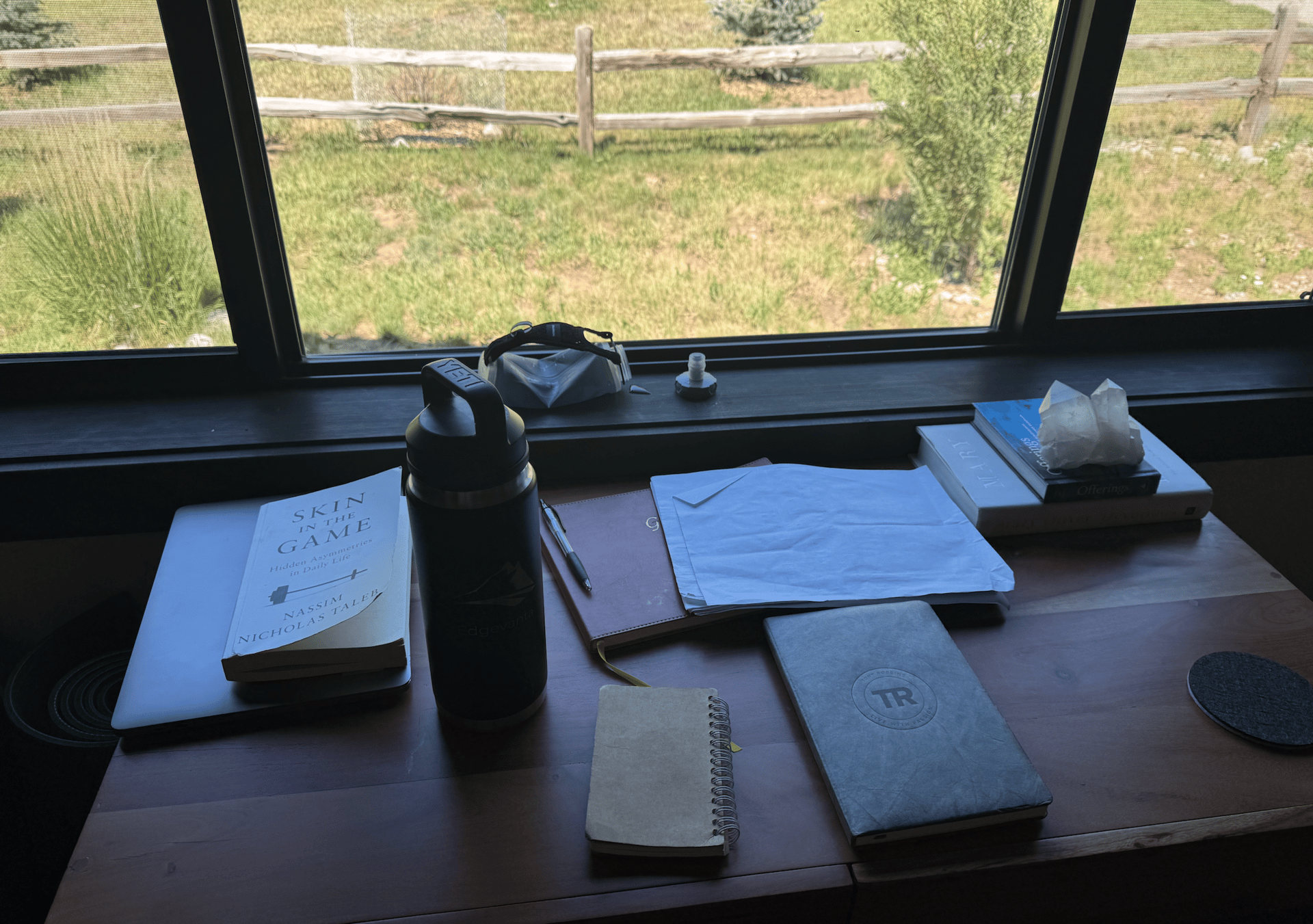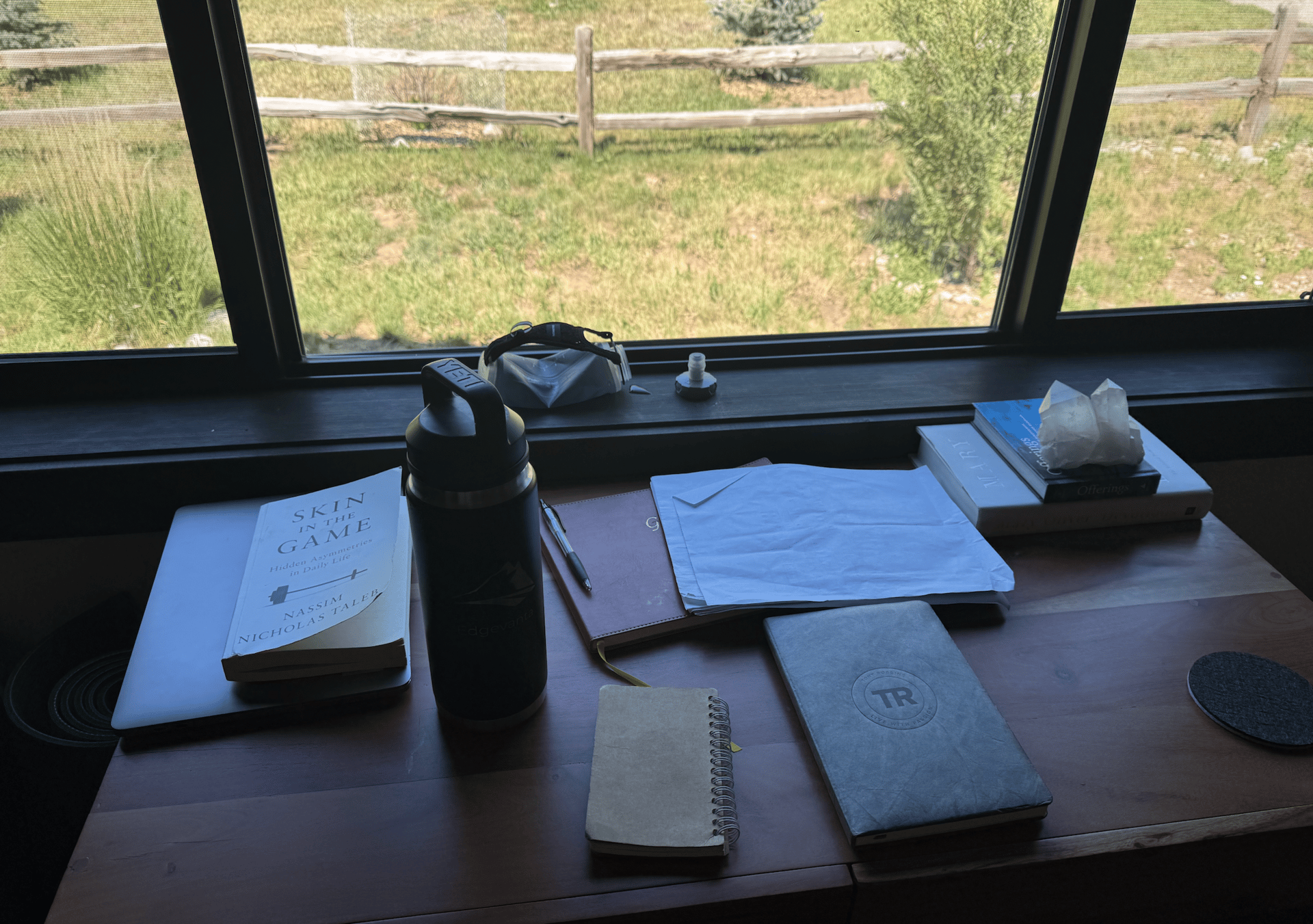- Edgevanta Weekly
- Posts
- Why Top Contractors Schedule Time to Do Nothing
Why Top Contractors Schedule Time to Do Nothing
Your essential guide to dominating the civil construction world with the latest tech, market trends, and wisdom.

"The world is full of distractions and I won't let them control my activity."
Those words from a mentor - who runs one of the nation's largest civil construction and materials companies - have stuck with me for years.
You'd expect someone with thousands of employees and massive projects to be constantly on his phone. Putting out fires. Stressing about the latest crisis. But that's not what makes him exceptional.
Instead, he regularly disappears with just a notebook, a pen, and his thoughts. He walks job sites without looking at his phone once. And every year, he takes an entire weekend away just to think - no devices, no interruptions.
What's most surprising? Despite being there for his people, he actually says "no" constantly. Meeting requests, conference calls, even important customers sometimes get a polite decline. He once told me, "If I said yes to every meeting, I'd have no time left to run the company." Instead, he guards blocks of "unstructured" time on his calendar and treats them as non-negotiable.

Command center... zero notifications
The Construction Industry's Blind Spot
In heavy civil, we pride ourselves on action. Moving dirt. Pouring concrete. Hitting milestones. But we rarely give ourselves the luxury of true reflection.
The irony? The highest-leverage work often happens when we step away from the daily chaos.
Jeff Bezos once said, "As a senior executive, you get paid to make a small number of high-quality decisions." The formula for quality decisions isn't more meetings - it's adequate sleep, physical movement, and genuine reflection. He insists on eight hours of sleep because, "I think better, I have more energy, my mood is better." Watch Bezos explain this at the Economic Club
The Power of Think Weeks
I've made this a personal practice. A few times a year, I take "think weekends" where I rent an Airbnb, cook simple meals, leave my devices behind, and just read and write. My brain requires time and space to process complex problems. The insights that emerge during these periods have shaped our product roadmap and company vision far more than any regular workday. And I only did it because a friend suggested it.
This isn't a new concept. Bill Gates famously takes "think weeks" twice yearly, retreating to a secluded cabin where he reads books and papers and contemplates big questions about technology and society. These focused periods have sparked major shifts at Microsoft over decades. See how Gates approaches his think weeks in Netflix's "Inside Bill's Brain"
While my plans for world domination aren't quite at Gates’ level yet, I'm working on it one think weekend at a time ;)
You might think: "That's fine for billionaires and founders, but I can't disappear for a week." This doesn’t require a title. Start with a day, or even just two dedicated hours. You'll be surprised how quickly your company learns to respect this boundary once they see the quality of thinking it produces.

Simple food, mountain air, and no devices
The Economic Reality
A single strategic insight - spotting a market opportunity, avoiding a bad hire, a better way to approach a bid, pivoting your service approach - can easily shift company performance by hundreds of thousands or millions.
Meanwhile, every hour spent in reactive mode, handling emails or sitting in unnecessary meetings, costs you opportunities to make those needle-moving decisions.
The math is straightforward, but we rarely frame it this way. We track equipment utilization down to the minute while neglecting the exponentially higher ROI of our mental capacity.
The Competitive Edge We Miss
While our industry fixates on faster processes and lower overhead, the contractors consistently outperforming their peers have discovered a different edge: they make better decisions because they create space to think clearly.
Most construction tech just helps you work faster. But the true competitive advantage isn't just speed - it's combining efficiency with better thinking. The technology should create space for the thinking that actually moves the needle.
From Hustle to Reflection
I was an absolute animal in my 20s and early 30s - working nearly every weekend, sleeping under my desk during crunch bidding times. I don't regret building that muscle.
Looking back, I made countless poor decisions while over-caffeinated and running on fumes. Now I'm learning something crucial: the most consequential decisions - key hires, strategic shifts, product direction - require clear mental space that's impossible to create while juggling calls and emergencies through a haze.
What works:
Prioritizing sleep like it's your most important job
Moving your body daily, preferably outside
Creating physical distance from your devices
Scheduling thinking time with the same rigor as critical meetings
If Jerry Seinfeld carves out 20 minutes twice daily for meditation, what's my excuse?
Your 7-Day Challenge
Here's what I'm asking you to consider trying this week:
Block two hours labeled "Strategic Thinking"
Choose ONE business challenge that needs fresh eyes
Physically leave your normal workspace
Bring only analog tools - notebook and pen
Turn your phone completely off
Email me what you discover ([email protected])
This isn't some productivity hack. This is about recognizing that your clarity of thought is your ultimate competitive advantage. It also shows us how humbling it is when the trains run on time without us.
There's a weird phenomenon where I need to hear someone else validate a practice I already know is good for me before I'll actually do it. As if I need permission to do something that seems "indulgent" but is actually essential. The truth is I don't need that permission. And neither do you.
Give yourself the gift of unstructured thinking time. Your company will thank you. Thanks for reading this week.
In Case You Missed It:
How would you describe today's newsletter?Leave a rating to help us improve the newsletter. |
Enjoyed this newsletter? Forward it to a friend and have them sign up here!

Tristan Wilson is the CEO and Founder of Edgevanta. We make AI agents for civil estimating. He is a 4th Generation Contractor, construction enthusiast, ultra runner, and bidding nerd. He worked his way up the ladder at Allan Myers in the Mid-Atlantic and his family’s former business Barriere Construction before starting Edgevanta in Nashville, where the company is based. Reach out to him at [email protected]